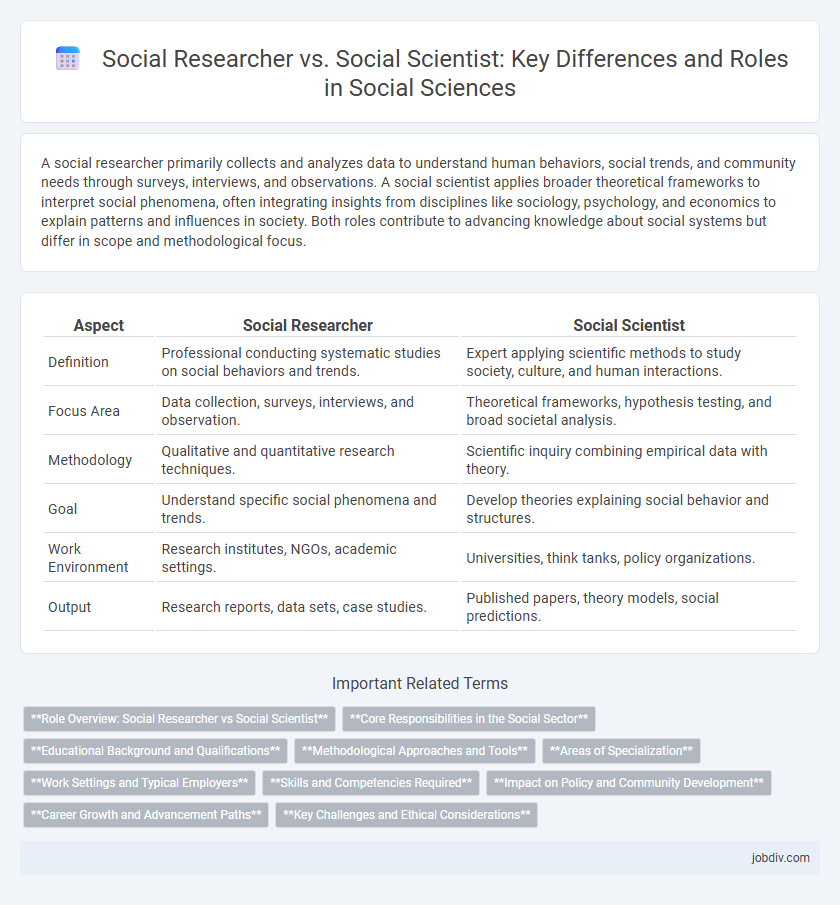A social researcher primarily collects and analyzes data to understand human behaviors, social trends, and community needs through surveys, interviews, and observations. A social scientist applies broader theoretical frameworks to interpret social phenomena, often integrating insights from disciplines like sociology, psychology, and economics to explain patterns and influences in society. Both roles contribute to advancing knowledge about social systems but differ in scope and methodological focus.
Table of Comparison
| Aspect | Social Researcher | Social Scientist |
|---|---|---|
| Definition | Professional conducting systematic studies on social behaviors and trends. | Expert applying scientific methods to study society, culture, and human interactions. |
| Focus Area | Data collection, surveys, interviews, and observation. | Theoretical frameworks, hypothesis testing, and broad societal analysis. |
| Methodology | Qualitative and quantitative research techniques. | Scientific inquiry combining empirical data with theory. |
| Goal | Understand specific social phenomena and trends. | Develop theories explaining social behavior and structures. |
| Work Environment | Research institutes, NGOs, academic settings. | Universities, think tanks, policy organizations. |
| Output | Research reports, data sets, case studies. | Published papers, theory models, social predictions. |
Role Overview: Social Researcher vs Social Scientist
Social researchers primarily design and conduct empirical studies to collect data on social behaviors, focusing on specific communities or issues to inform policy or program development. Social scientists use a broader theoretical framework to analyze social phenomena, integrating interdisciplinary knowledge from sociology, anthropology, economics, and political science. Both roles contribute to understanding societal dynamics, but social scientists emphasize theory-driven analysis while social researchers prioritize applied data collection methods.
Core Responsibilities in the Social Sector
Social Researchers primarily focus on gathering and analyzing qualitative and quantitative data to understand social behaviors, trends, and issues within communities. Social Scientists utilize interdisciplinary theories and methodologies to interpret social phenomena, develop policies, and contribute to academic knowledge across fields such as sociology, anthropology, and economics. Both roles contribute to evidence-based decision-making but differ in scope, with Social Researchers emphasizing empirical data collection and Social Scientists focusing on broader theoretical frameworks and societal implications.
Educational Background and Qualifications
Social researchers typically hold bachelor's or master's degrees in sociology, psychology, or related fields, emphasizing practical research methods and data collection techniques. Social scientists often pursue advanced degrees such as PhDs in disciplines like anthropology, economics, or political science, focusing on theoretical frameworks and interdisciplinary knowledge. Qualifications for social scientists generally include a strong foundation in both qualitative and quantitative analysis, preparing them for academic, policy-making, or applied research roles.
Methodological Approaches and Tools
Social researchers primarily employ qualitative and quantitative methods such as surveys, interviews, and ethnography to collect and analyze data, emphasizing empirical investigation and practical fieldwork. Social scientists integrate diverse methodological approaches, including experimental designs, statistical modeling, and theoretical analysis, often leveraging advanced tools like computational simulations and big data analytics. Both roles utilize software such as SPSS, NVivo, or R, but social scientists typically engage more deeply with interdisciplinary methodologies to explore complex social phenomena.
Areas of Specialization
Social researchers primarily specialize in empirical data collection, including qualitative methods such as interviews and ethnography, as well as quantitative techniques like surveys and statistical analysis. Social scientists encompass broader areas of specialization, integrating disciplines such as sociology, psychology, anthropology, economics, and political science to examine complex social phenomena and theories. Both roles require expertise in analyzing social behavior, but social scientists often focus on theoretical frameworks while social researchers emphasize practical application and data-driven insights.
Work Settings and Typical Employers
Social researchers primarily work in academic institutions, government agencies, and non-profit organizations, where they focus on data collection and analysis to inform social policies. Social scientists often find employment in universities, research institutes, and private sector firms, conducting theoretical and applied studies across various social phenomena. Both roles collaborate with think tanks, public health organizations, and international bodies, but social scientists tend to engage more in interdisciplinary research projects.
Skills and Competencies Required
Social Researchers require strong qualitative and quantitative research skills, proficiency in data collection methods, and expertise in statistical analysis software such as SPSS or R. Social Scientists must possess a comprehensive understanding of social theories, critical thinking abilities, and interdisciplinary knowledge encompassing sociology, psychology, and economics. Both roles demand excellent communication skills for presenting findings, ethical awareness, and the capacity to design and implement robust research methodologies.
Impact on Policy and Community Development
Social researchers analyze community behaviors and social patterns to provide empirical data that directly informs policy decisions, enabling targeted interventions that address specific social issues effectively. Social scientists apply broader theoretical frameworks to interpret social phenomena, influencing policy by shaping overarching strategies for community development. Both roles are crucial in designing evidence-based policies that foster sustainable social change and improve community well-being.
Career Growth and Advancement Paths
Social researchers often progress through roles such as research analyst, project manager, and senior researcher, gaining specialized skills in data collection and analysis within social contexts. Social scientists pursue broader career advancement, including academic positions, policy advisory roles, and leadership in research institutions, leveraging interdisciplinary knowledge across sociology, economics, and political science. Both paths value advanced degrees and publication records, but social scientists typically access higher-level administrative and consultative opportunities.
Key Challenges and Ethical Considerations
Social researchers face key challenges such as data privacy, informed consent, and potential researcher bias, which require stringent ethical protocols to ensure participant protection and data integrity. Social scientists contend with balancing theoretical frameworks and empirical evidence while addressing the societal impact of their research, necessitating transparency and accountability. Both roles demand ongoing ethical vigilance to navigate complexities in human behavior studies and maintain public trust.
Social Researcher vs Social Scientist Infographic

 jobdiv.com
jobdiv.com